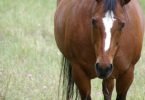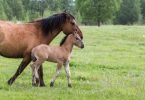Gastric ulcers in horses are common. Racehorses that are in training suffer more from gastric ulcers. And severity increases as the training period progresses. The percentage of racehorses that suffer from gastric ulcerations is approximately 90% as compared to 60% of show horses as well as other non-performance horses. In this article, we will discuss all the nits and grits of gastric issues in horses.
To know more about different health problems in horses, check this article “Health Problems in Horses – The Most Comprehensive Account of the Major Health Issues in Horses“.
Introduction – Gastric Ulcers
As there is no age limit for gastric ulcers, therefore, it can occur in horses of any age. Among other horses, foals are more prone to developing gastric ulcers. The reason is that the gastric lining of foals is not developed properly yet. And also, their stomach lining is thinner as compared to adult horses. Therefore, this increases the risk of ulceration. Also, foals start to secrete concentrated gastric acid from the age of days. And the amount of acid secreted is increased if they are not eating enough forage that can buffer the acid.
For foals, make sure that they get the appropriate amount of colostrum. The reason is that colostrum contains epidermal growth factors. Thus, it enhances the development of gastric mucosa. Don’t understand what gastric mucosa is? Don’t worry, we’ll explain it in a later section. To prevent gastric ulcers in foals, use creep feeding. Creep feeding supplements the diet of young livestock during nursing. This increases the appetite for forage. You should also minimize stress by preventing rough handling, illness, unnecessary transport and weaning too early.
Before diving right into the symptoms, causes, and treatment of gastric ulcers in horses, let’s understand the anatomy of a horse’s stomach.
the stomach of a horse is divided into two parts:
- squamous, the upper part
- glandular mucosa, the lower part
Glandular mucosa secretes acid. As mentioned in the name, this part is glandular. The bottom part of the stomach also has a protective coating that prevents it from damage caused by acid. Thus, it is less common for glandular mucosa to suffer from ulcers.
The upper part, squamous, mixes the contents of the stomach and it doesn’t have much protection from acid as compared to glandular mucosa. Therefore, it becomes the most commonplace for gastric ulceration in horses.
Types of gastric ulceration in horses
Equine Squamous Gastric Ulcer Syndrome (ESGUS) | Equine Glandular Gastric Ulcer Syndrome (EGGUS): |
Symptoms: slowed eating, changes in pattern appetite, and poor performance or Behavioral change. |
Symptoms: variable, non-specific. |
Symptoms of gastric ulcers in horses
Symptoms of gastric ulceration in horses are very subtle. Most horses don’t show any outward signs. Clinical signs become apparent when ulcer becomes severe. However, you should look for small changes in temperament and discuss those signs with your vet.
Clinical signs of gastric ulceration in horses include:
- Poor body condition
- Decreased performance and reluctance to train
- Chronic diarrhea
- Poor appetite
- Weight loss
- Teeth grinding
- Poor hair coat
- Crib-biting
- Irritability
- Low-grade colic
Some horses have gastric ulcers when their owner presents with complaints of colic. Because the gastric ulcer symptoms are so subtle that the horse appears normal. However, in severe cases, you may find a horse on its back. This position reduces the discomfort that the horse experiences due to gastric ulceration.
Foals with gastric ulcers show clinical symptoms such as intermittent nursing, frequently lying down, intermittent colic, diarrhea, grinding of teeth, poor appetite, and excess salivation.
When the horse shows above mentioned signs, it means that ulcer is severe. You should immediately consult your vet.
Causes of gastric ulcers in horses
Generally speaking, what makes horses more susceptible to gastric ulcers is routine, activities and inappropriate feeding practices.
Intensive training
Well! Rigorous exercise and intense training are the utmost contributors to gastric ulceration in horses. During exercise, gastric splashing occurs. In gastric splashing, stomach contracts and splash gastric acid from glandular mucosa up onto the unprotected upper part. This increases the risk of developing gastric ulceration in horses. If the horse is fed before exercising, it can reduce the risk of developing gastric ulcers.
Intermittent feeding
Horses are designed to graze and to have a constant stream of feed. For that matter, the stomach of the horse continually secretes acid. The horse develops gastric ulcers when he is not eating regularly and an appropriate amount of food that neutralized the acid.
High starch diets/low-fiber or forage
The pH level of the horse’s stomach depends on the type of food that the horse eats because different types of food produce different amounts of saliva. A healthy horse should produce 12 liters of saliva per day. The reason behind this is; saliva buffers acidic environment in the stomach because it contains high pH and a high bicarbonate level. As chewing stimulates the production of saliva and chewing depends on the type of food, it is important to consider the types of food that you give to your horses.
Transport
When you transport horses, you must constantly provide water and food. This reduces the risk of developing ulcers.
Some other causes of gastric ulceration in horses are stress and some medications such as NSAIDs. Both physical and environmental stress increases the likelihood of gastric ulcer. And chronic administration of non-steroidal anti-inflammatory drugs causes ulcers. These drugs decrease the production of the protective mucus layer of the stomach and make it more prone to developing a gastric ulcer. Such medicines include flunixin meglumine, phenylbutazone, or ketoprofen.
Diagnosis of gastric ulcers in horses
Timely and correct diagnosis of any disease is very important. And gastroscopy is the only way you can accurately detect a gastric ulcer. In gastroscopy, an endoscope is inserted into the stomach to look at its wall. This process is done empty-stomach. As the endoscope is inserted through the nostril down into the stomach via the esophagus, therefore, horses are sedated. A light and camera are attached to the tip of the endoscope which makes the vet able to look at the stomach lining. Since feed material can hinder the process of evaluation, the food is withheld for 4 hours and feed for 12 hours.
Well! Sometimes it becomes difficult to detect ulcers in the bottom part of the stomach, using an endoscope. Therefore, there are other methods as well, such as:
- Manure pH tests can be used to find out if bacteria in the horse’s stomach are active or inactive. High pH indicates that bacteria are alive and vice versa. A mete is used to test and analyze the pH of manure.
- The fecal blood test is less costly as compared to endoscopy. The test takes almost 15 minutes to complete.
- Ultrasounds are used to diagnose colonic ulcers.
Treatment of gastric ulcers in horses
After diagnosis, your vet will prescribe you the appropriate treatment plan for gastric ulceration in horses. However, most vets prescribe a combination of nutritional digestive supplements, medication, and a low-concentration, high-roughage diet.
Frequent feedings often help neutralize the acid. Along with intervals, the type of food is also important. Because volatile fatty acids contribute to the development of a gastric ulcer, try to decrease the type of grain that forms them. Instead, you can feed grain that is higher in fat. If your horse requires low-calories, you can feed grass hay along with vitamin and mineral supplements.
Antacids are used to buffer the pH level in the stomach. However, the dose of antacids required in horses is high. And to be effective for gastric ulcers in horses, it is administered several times a day. Moreover, antacids are used in combination with acid pump inhibitors. One of the effective drugs for gastric ulceration in horses is Omeprazole. Omeprazole is the only drug that is approved by the Food and Drug Administration. It suppresses stomach acid production and has a high-efficiency rate.
Your vet may also prescribe mucosal protectants. As the name suggests, these drugs increase mucus concentration and provide a protecting coating. Another thing that works like a mucosal protectant is a digestive supplement. Digestive supplements help gut function and provide support to heal and recover. Some of the best digestive supplements are:
Uckele Gut Horse Supplement
Description
It contains a blend of pre and probiotics. It contains a highly effective and broad spectrum of nutrients for gastrointestinal health.
Pros
- Good quality
- Helpful to comfort horse
Cons
- Bad taste for some horses.
SynNutra Equine GastroMend-Ulcer Supplement for Horses
Description
It possesses natural contents to encourage fibronectin and collagen production, which supports the process of ulceration healing. It also encourages ideal epithelial growth.
Pros
- Good in taste
- Natural
- Budget-friendly
Cons
- Some horses may exhibit an allergy to the product.
U- 7 Powder by Finish Line
Description
This product is safe for horses of all ages. It is a herbal powder with vitamins that enhances the health of the digestive system of your horse.
Pros
- Support digestive tissues
- Prevent recurrence of gastric ulcer
Cons
- A bit expensive
Natural remedies for gastric ulcers in horses
Apart from medications, there are also some natural remedies to cure gastric ulcers in your horse. Not all remedies are equally effective. That is why you should always consult your vet before starting anything new. Some natural remedies for gastric ulcer are:
Lecithin granules combined with apple pectin
Lecithin granules and apple pectin serve as a nutritional supplement. This supplement cures the ulcer by strengthening the mucosa. Along with treating ulcers, it also strengthens the stomach lining at a cellular level.
Licorice
Licorice is also used to cure gastric ulcers as it reduces inflammation in the stomach. But you should be careful enough using licorice because it reduces stomach secretions if it is used for longer periods.
Aloe vera
Aloe vera is excellent for balancing hydration in horses with gastric ulcers. It soothes the stomach and digestive tract and helps heal the gut.
Some other herbs that are beneficial for horses with gastric ulcers are Marshmallow, chamomile, Meadowsweet, and Dandelion root. The form of herb and its dosage is important. It is also important to monitor horses during treatment. No matter which type of treatment you choose, it is better that you also maintain prevention.
Prevention of gastric ulcers in horses
Prevention of ulcers is crucial before or even after your horse develops ulcers. Following management tips may help you prevent the agony that your horse will face in the form of gastric ulcer:
- If you stall your horses, allow them to socialize with other horses as well. Also, make sure that they have access to forage
- Limit stressful situations such as frequent transport and vigorous exercise or training.
- Reduce grain-based intake. You can add alfalfa hay to the diet.
- Add digestive supplements into the horse’s daily feed.
- Include probiotics in a horse’s diet.
- Keep routine consistent because sudden changes in routine can predispose a horse to gastric ulcer.
Conclusion
Even though gastric ulcers in horses are quite an unfortunate part of horse ownership, but recognizing early signs and contacting your vet for treatment immediately, it saves you and your horse from a more painful condition. Many factors result in gastric ulcers, but following suggested feeding and management practices can minimize the chances of ulcers. This will also improve the wellbeing and performance of your horse.
To know more about different health problems in senior horses, check this article “Senior Horse Health Problems – Potential Risks, Symptoms, Causes, and Treatment“.






